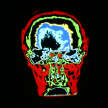Funniest Sci-Fi Comedies
Difficult to produce, the funniest sci-fi comedies are as educational as they are hilarious.
While there have been dozens of great science fiction dramas, sci-fi comedies are inherently harder to pull off. A writer and director have only a couple of hours to introduce a premise like time travel, lay out the rules and demonstrate how they work, and make it accessible enough to a general audience that the jokes actually land. That it isn’t as easy as it looks is evident from the number of mediocre and outright-terrible sci-fi comedies that litter the history of sci-fi film.
But when it actually works, the result is some fantastically memorable sci-fi entertainment—movies that explore weighty concepts like space travel, fandom, the end of the world, and accidentally preventing your parents from falling in love, but doing it so cleverly that audiences of the funniest sci-fi comedies don’t even realize how much they’re learning.
A loving satire that both spoofs and honors the Star Trek fandom, Galaxy Quest earned the appreciation of Star Trek's Leonard Nimoy and George Takei. It also gave Tim Allen his best film role. Allen plays a washed-up Shatner-esque celebrity who agrees to act in an amateur film made by some fans of a show in which he starred nearly 20 years ago. Only when filming ends does he realize he’s just defeated an actual alien in battle, and that the fans are really aliens who mistook his show for a documentary. The movie became part of Alan Rickman's legacy, and earned unexpected pathos from hiss performance as Sir Alexander Dane, a former Shakespearean actor who hates the role that made him a star.
Douglas Adams’ Monty Python-esque space comedy novel, an adaptation of his own BBC radio series, spawned several sequels and a TV show before becoming an almost universally well-received feature film in 2005. And the film adaptation of The Hitchhiker's Guide to the Galaxy is British humor at its driest. When Earth is destroyed to make way for a space highway, Arthur Dent ventures into space while accompanied by a couple of lovable oddballs and the titular guidebook. Although the plot of the movie diverges wildly from the original, it retains the premise and understated, droll humor of the series (abetted by Stephen Fry as the voice of the book). Alan Rickman’s sardonic performance as Marvin the Paranoid Android briefly made the depressed robot a pop cultural icon.
When Russell T. Davies and Steven Moffat reinvented the old British serial Doctor Who for the 2000s, they envisioned it as a genre-busting amalgam of adventure, fantasy, comedy, drama, and sci-fi. What resulted was one of the funniest sci-fi comedies on television—one that might have you laughing and cowering under your TARDIS blanket in terror within the same scene. Standout episodes include “Love and Monsters,” about a group of nerdy Whovians who form a support group, and “The Lodger,” a loving homage to Back to the Future in which the Doctor hides out in suburbia and plays matchmaker to a couple of shy twenty-somethings.
Often lauded as the definitive reference for sci-fi comedies, Back to the Future became one of the most enduring films of the 1980s and made stars out of its two leads, Christopher Lloyd (as the mad scientist and inventor Doctor Emmett Brown) and Michael J. Fox (as guitar-playing high-schooler Marty McFly). The movie is almost perfectly structured, setting up jokes and plot devices in the opening scenes that pay off in the final half-hour in spectacular fashion. None of this would work without a solid emotional core, but the movie delivers when Marty’s young father finds his courage (and saves their family from being erased from existence), a moment of catharsis that secured the film’s place in history.
The underrated first sequel to Back to the Future sees Doc Brown and Marty traveling 30 years into the future, to the year 2015, to prevent one of Marty’s kids from making a mistake that could ruin their whole family. Yet Marty makes an even worse mistake and returns to his own time to find that local bully Biff Tannen (Thomas F. Wilson III, playing four roles) has used the time machine to create a nightmarish alternate reality where he’s the richest man in America. At once the darkest and funniest sci-fi comedies in the trilogy, Back to the Future II has a wickedly convoluted finale that recreates the final act of the first movie.
The low-budget feature that brought indie director Colin Trevorrow to the attention of Steven Spielberg and Universal, Safety Not Guaranteed is a road trip comedy inspired by a famously tongue-in-cheek classified ad: “Wanted: someone to go back in time with me. This is not a joke… I have only done this once before.” The film centers around the efforts of a young man and woman to track down the ad’s writer, who may or may not be a real time-traveler and is almost certainly wanted by the federal government. What results is a surprisingly sensitive and thoughtful meditation on grieving and the fear of being alone.
A wildly inventive time travel fantasy written by two Monty Python alums (and directed by one of them), Time Bandits follows the adventures of a boy named Kevin who’s kidnapped by dwarves and taken to various past eras, where he meets the likes of Napoleon, Robin Hood, and King Agamemnon. Like many 1980s family films, the movie features a surprising amount of dark humor, while the overarching moral—that unchecked greed and materialism can destroy the world—lends depth to what might otherwise be an overbearingly zany premise. Sean Connery, Ian Holm, and Ralph Richardson show up to give the film additional gravitas.
The story of a group of parapsychologists battling ancient demons and malevolent spirits in New York City shouldn’t have worked. That it resists being unbearably campy is largely a testament to the effortless chemistry and comedic timing of the three leads, SNL alumni Bill Murray, Dan Ackroyd, and writer Harold Ramis (who also directed). Ackroyd and Ramis' quippy script and Murray’s droll line readings keep the film from taking itself too seriously. Together, they elevate what might otherwise have been an empty special effects showcase. Sadly, lightning never struck twice: the sequel was reportedly so dispiriting that Murray refused to sign off on a third film. However, the Ghostbusters franchise fought for survival and rebooted the movie in 2016.
The seminal sci-fi show of the 1990s is remembered today for its scares and its convoluted, unsatisfying mythology. But part of what set the show apart from others of its genre (including its dozens of imitators) was the flexibility of its premise. It was equally at home doing horror and self-aware comedy, and some of its best episodes were those that poked gentle fun at The X-Files mythos and its legions of fans. Memorable examples include “The Postmodern Prometheus” from Season Five, a black-and-white retelling of Frankenstein featuring a monster that loves Cher, and “Jose Chung’s From Outer Space” from Season Three, starring Jesse “the Body” Ventura and Alex Trebek as two men in black who may or may not exist.
John Carpenter’s equal parts funny and horrifying Reagan-era satire conjures a dystopian America secretly ruled by alien creatures in business suits. Construction worker John Nada (the surprisingly excellent “Rowdy” Roddy Piper) learns their secret when he finds a pair of sunglasses that reveal their true natures, and a subliminal world of television commercials and billboards carrying messages like “OBEY” and “CONSUME.” The high point of the movie is undoubtedly Piper mowing down a bank full of aliens: “I have come here to chew bubblegum and kick ass,” he says, “and I’m all out of bubblegum”—a line that was famously ad-libbed on set. Parts of the film are hard to watch in an era of mass shootings and gun violence, but Carpenter’s disdain for capitalism and enforced conformity has never felt sharper (or more needed).
The best of the supernatural procedurals to follow The X-Files is anchored by a multilayered performance from John Noble as Walter Bishop, a scientist with a tragic past and a deep love for his only son Peter (Joshua Jackson). Noble gives the show its most harrowing and its funniest moments, as he explores fringe ideas like time travel and parallel worlds in a lab at Harvard with the aid of a dairy cow named Gene. During the course of the show’s run, Walter demonstrates a talent for slipping out of his clothes and a love for recreational drugs, as epitomized in the immortal line, “Let’s make some LSD.”
About the Creator
Futurism Staff
A team of space cadets making the most out of their time trapped on Earth. Help.






Comments
There are no comments for this story
Be the first to respond and start the conversation.